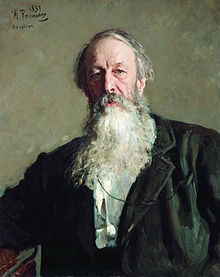
by Ilya Repin.
Vladimir Vasilievich Stasov (also Stassov; Russian: Влади́мир Васи́льевич Ста́сов; 14 January [O.S. 2 January] 1824 – 23 October [O.S. 10 October] 1906),[1] was a Russian critic of music and art. Born into a wealthy, noble family, Stasov became a prominent figure in mid-19th-century Russian culture.[2] He discovered a large number of its greatest talents, inspired many of their works and fought their battles in numerous articles and letters to the press. As such, he carried on a lifelong debate with Russian novelist and playwright Ivan Turgenev, who considered Stasov "our great all-Russian critic."[3] He wanted Russian art to liberate itself from what he saw as Europe's hold. By copying the west, he felt, Russian artists could be, at best, second-rate. However, by borrowing from their own native traditions, they might create a truly national art that could match Europe's with its high artistic standards and originality. By "national" Stasov meant an art that would not only portray people's lives but also be meaningful to them and show them how to live.[4]
- ^ "Стасов В. В. — Музыкальная энциклопедия".
- ^ "House of Stasov".
- ^ Figes, 177.
- ^ Figes, 178.